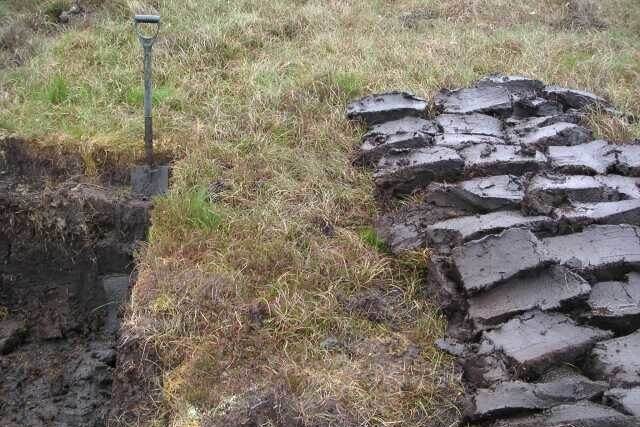
New research suggests that rewetting about half of England’s lowland peat could play a crucial role in delivering a fifth of the greenhouse gas emissions reductions needed from the country’s farming sector by 2030.
Aside from emissions savings, rewetting peatlands would also help restore habitats for birds, wildlife, and plant species. However, farming experts are skeptical about the feasibility and potential of such projects.
The study, conducted by the Green Alliance thinktank, reveals that food produced on lowland peat in England has a significantly higher carbon footprint compared to soy imports from Brazil. This disparity arises because wet peat naturally sequesters carbon, whereas drained and farmed peat emits about 19 times more carbon than non-peat cropland.
Given this understanding, the Green Alliance emphasises that rewetting peat, achieved through measures like removing drainage or constructing dams to retain water, should be a priority for the government. Lowland peat accounts for only about 1% of the UK’s farmland, so even if half of it were rewetted, it would have minimal impact on land availability while making a substantial contribution to the country’s efforts to reach net zero emissions.
However, farmers have contested these findings, pointing out that drained peatlands, including the fens of East Anglia, are some of the UK’s most productive farmland. They argue that a simple comparison of land area does not adequately represent the true value of these farmlands.
Farming remains one of the major sources of greenhouse gas emissions, and previous efforts by the government to reduce agricultural emissions have fallen short of producing the necessary changes. The Green Alliance analysis suggests that offering stronger incentives to farmers to rewet lowland peat through environmental land management schemes might be a more effective approach.
Lydia Collas, the author of the research at Green Alliance, said: “In its natural form, lowland peat can support a huge range of wetland species and absorb significant rainfall, preventing flooding downstream.
“Everyone knows that clearing Brazilian rainforest for soya production is a disaster for the climate and for nature, but we’re sabotaging our own environment by growing grain on lowland peat.”
Despite this, many farmers remain unconvinced. Aidan Gill, an environment policy adviser at the National Farmers’ Union, highlights the potential impacts on food production depending on the specific areas affected.
“The highly productive East Anglian fens produce more than 7% of England’s total agricultural production, worth £1.2bn, so rewetting peat soils [there] would be quite a significant land use change and have a big impact on UK food security,” he said.
He added that rewetting fields cannot be carried out in isolation, and there is a risk of flooding to surrounding areas.
The issue of rewetting peatlands raises complex challenges, requiring a careful balance between environmental benefits and agricultural productivity. As the UK continues its journey towards sustainability and carbon neutrality, finding viable solutions that consider the diverse interests of stakeholders will be crucial to effectively combatting climate change.
Gareth Morgan, the head of farming policy at the Soil Association, also urged caution. “The fens are crucial for rural communities and domestic food production, supplying a third of British-grown vegetables.
“A poorly thought-out change in land management on the fens could increase reliance on imports, weakening the resilience of our local food systems, and contributing to emissions and habitat loss abroad,” he told the Guardian.
He said the Soil Association agreed that rewetting peat in some areas was needed but called on the government to “work with local farmers and use their expert knowledge of the land to adopt a mosaic approach that maintains nature-friendly farming in the most suitable areas while rewetting and restoring peatlands in others”.
“A one-size-fits-all approach will be inappropriate,” he said.
A spokesperson for the Department for Environment, Food and Rural Affairs said: “We made clear in our plan for water that reducing emissions from peatlands will require rewetting – and are committed to working with farmers and other land managers to halt the degradation of our lowland peat soils.
“Later this year, we will launch a £6.6m lowland peat research and development programme to help us identify the best way to reduce emissions from peatlands.”
——————————————————————————
At Natural World Fund, we are passionate about stopping the decline in our wildlife.
The declines in our wildlife is shocking and frightening. Without much more support, many of the animals we know and love will continue in their declines towards extinction.
When you help to restore a patch of degraded land through rewilding to forests, meadows, or wetlands, you have a massive impact on the biodiversity at a local level. You give animals a home and food that they otherwise would not have had, and it has a positive snowball effect for the food chain.
We are convinced that this is much better for the UK than growing lots of fast-growing coniferous trees, solely to remove carbon, that don’t actually help our animals to thrive.
This is why we stand for restoring nature in the UK through responsible rewilding. For us, it is the right thing to do. Let’s do what’s right for nature!
Donate today at https://naturalworldfund.com/ and join in the solution!

